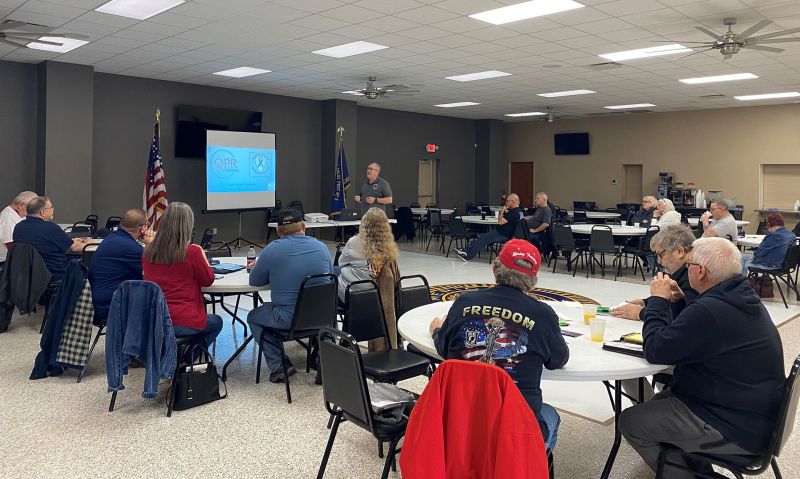
Suicide prevention training educates Missouri Legionnaires to listen
American Legion Roscoe Enloe Post 5 in Jefferson City, Mo., wanted to support the Legion’s "Be the One" suicide prevention campaign by helping others know how to identify warning signs and “Be the One” to save the life of a veteran in crisis.
On Saturday, March 25, the post hosted a veteran suicide awareness training event with Jon Sabala, director of Veterans Services with the Missouri Department of Mental Health. Sabala is a certified Question, Persuade, Refer (QPR) suicide prevention program instructor through QPR Institute. He educated attendees on how to recognize clues or suicidal communication, how to listen and how to get the person in crisis immediate help.
“We want to support Be the One. We know how important this is,” said Post 5 Commander Dee Dee Cryderman. “Missouri is ranked No. 19 (among states) in suicides, so we really wanted to get this training and awareness out there. It was an awareness of what you should be looking for and how you should handle it. Because the more we get the awareness out there, the better we can help our people.”
The training was free and open to the community. Around 30 people attended, including Legion Family members from Post 5 and other nearby posts, and the community.
“It’s not just veterans. There’s suicide among our young community too,” Cryderman said. “That’s why we wanted to open it up to the public, because sometimes parents may not be hearing the clue words and then it’s too late. So awareness is a lot of that.”
In his training, Sabala provided direct verbal clues that may be communicated such as “I wish I were dead” while indirect verbal clues may be "I'm tired of life. I just can't go on."
Listening for these verbal clues was advocated by Sabala, Cryderman said.
“If you see someone struggling, listen to them,” she said. “Don’t take over the conversation. Let them talk. Let them know that they’re not by themselves; you’re there. Engage to get them in a positive attitude and get them some help.
To help with identifying clue words, role play scenarios were done among the attendees.
“It was good to see the role playing and hear it because you could pull out those clue words. There are times in my life where I have heard these words, but I never picked up on them. If you don’t know those clue words you could have someone sitting in front of you and they’re saying them, but you don’t catch on,” said Cryderman, adding that afterward it may be too late. “You think, ‘Could I have done something if I only knew?’ I’m sure all of us know someone who died by suicide and you walk away with that feeling of, ‘Why didn’t I know?’ They don’t always come looking for help. They do it in their words or their actions.”
QPR training educates on how to:
Question someone if they are suicidal;
Persuade the person to live;
Refer them to help.
"You are not expected to treat people that are experiencing a suicidal crisis,” Sabala said to the News Tribune. “This is not your role. What you will do is learn how to offer hope and positive action. So asking about suicide cuts through that darkness. And lets them think, 'Oh my gosh, someone sees me and someone cares."
Cryderman said the training was well received with great feedback and would like to see the QPR training hosted at the post at least once a year.
“A lot of people are nervous when you talk about mental health,” she said. “But you know what, it’s there. We have to address this. It does affect everyone. We have to take care of our veterans; we have to take care of our people. We just need to listen more.”
If you’re a veteran in crisis or concerned about one, contact the Veterans Crisis Line to receive 24/7 confidential support. Dial 988 then Press 1, chat online at VeteransCrisisLine.net/Chat or text 838255.
